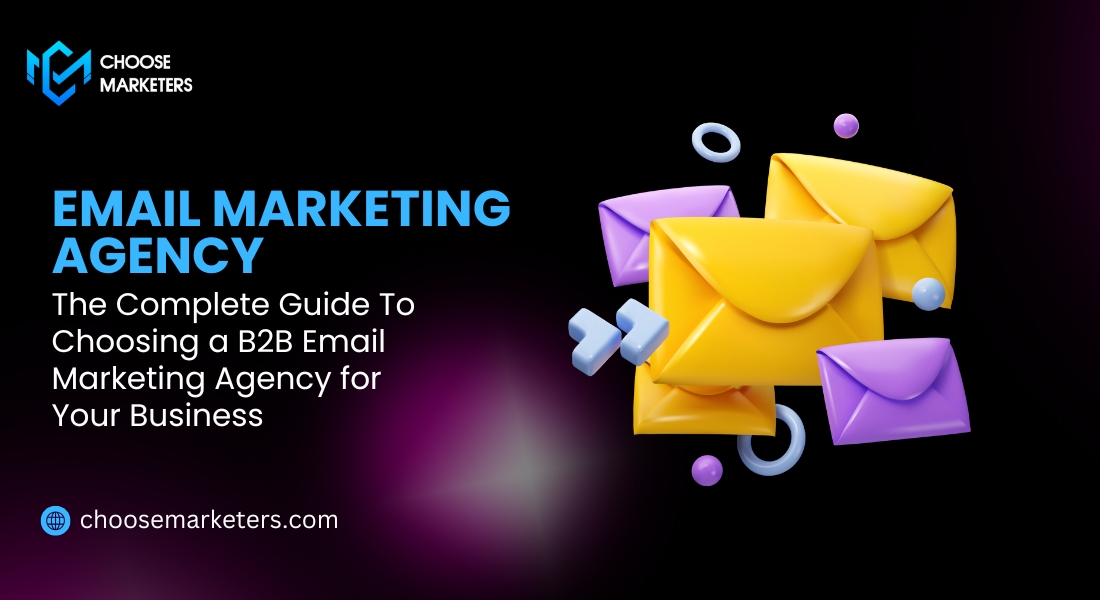

The Complete Guide to Choosing a B2B Email Marketing Agency
In today’s digital landscape, email remains a powerful tool for businesses, particularly in the B2B space. A B2B email marketing agency can play a pivotal role in helping businesses build strategic, personalized, and scalable campaigns that engage potential clients and drive long-term growth. With the right agency, businesses can optimize every aspect of their email marketing efforts, from content creation to advanced segmentation, ensuring that each campaign delivers maximum return on investment (ROI).
What Is a B2B Email Marketing Agency?
A B2B email marketing agency specializes in helping companies market to other businesses through tailored email campaigns. These agencies offer a range of services designed to generate leads, nurture prospects, and ultimately convert them into customers. Unlike traditional email marketing, which often targets individual consumers, B2B agencies focus on engaging decision-makers within organizations. This requires a different approach, emphasizing personalized messaging, lead nurturing, and multi-touchpoint strategies to address the complexities of B2B sales cycles.
Benefits of Hiring a B2B Email Marketing Agency
Working with a this agency provides numerous advantages, including:
Expertise in Strategy Development: Agencies bring specialized knowledge in creating comprehensive email strategies that align with a company’s business goals, audience, and industry trends.
Improved Efficiency and Automation: Agencies manage the end-to-end process, allowing businesses to focus on core activities. This includes setting up automation workflows, lead nurturing, and follow-up campaigns.
Cost Efficiency: By outsourcing email marketing, companies gain access to expert teams and advanced tools without the overhead costs of hiring an in-house team.
Enhanced Data and Analytics: B2B agencies provide detailed reporting on key metrics such as open rates, click-through rates, conversions, and ROI. This data-driven approach enables continuous optimization of email campaigns.
How B2B Email Marketing Differs from B2C
While both B2B and its email marketing aim to convert leads into customers, their strategies differ significantly. Understanding these differences is crucial to creating successful B2B campaigns:
Longer Sales Cycles: B2B sales typically involve multiple stakeholders and longer decision-making processes, requiring sustained engagement over time through well-timed email campaigns.
Content Focus: B2B emails often focus on educational content, showcasing expertise, addressing pain points, and offering solutions, whereas B2C campaigns are more emotionally driven.
Target Audience: B2B campaigns target decision-makers such as CEOs, managers, or procurement officers. These recipients expect high-value content that aids in their decision-making process.
Services Provided by a B2B Email Marketing Agency

A B2B email marketing agency offers an array of services, each designed to enhance different aspects of email marketing. These include:
Strategy Development: Agencies work with businesses to develop a robust email marketing strategy that aligns with overall marketing goals.
Email Design and Content Creation: Creating professional, visually appealing email templates and crafting compelling content tailored to the recipient’s needs.
List Segmentation: Agencies segment contact lists based on specific criteria (e.g., industry, company size, job role) to ensure that the right message reaches the right audience.
Automation Setup: Implementing marketing automation tools to send targeted emails based on recipient behavior or pre-determined triggers.
Analytics and Reporting: Providing insights into campaign performance through detailed analytics on open rates, click-through rates, and conversions.
Building a Successful B2B Email Strategy
A well-crafted third party email strategy is essential for nurturing leads and converting them into customers. A B2B email marketing agency can help businesses structure their campaigns to engage their audience at different stages of the buyer’s journey:
Understanding the Sales Funnel: It’s crucial to understand the buyer’s journey, from awareness to decision-making, and create email content that supports leads at each stage.
Creating Personalized Campaigns: Personalization is key in B2B marketing. Addressing recipients by name and tailoring content based on their company’s needs can significantly boost engagement rates.
Optimizing Send Times: Ensuring emails are sent at optimal times, considering the recipient’s time zone and work schedule, helps improve open and response rates.
Lead Generation and Nurturing Through Email
One of the primary goals of B2B email marketing is lead generation. This marketing agency can help businesses implement lead generation techniques through email, including:
Targeted Campaigns: Segmented campaigns based on industry, company size, or behavior can result in higher engagement and better lead quality.
Drip Campaigns: Drip email sequences gradually nurture leads by providing them with valuable information over time, helping move them through the sales funnel.Lead Scoring: Assigning scores to leads based on their interactions with emails allows businesses to prioritize high-potential prospects.
The Role of Email Personalization in B2B Campaign
Personalization goes beyond addressing recipients by name. This email marketing agency leverages data to create highly personalized content tailored to the recipient’s industry, role, or past behavior. This approach significantly increases engagement by making emails more relevant to the recipient’s specific needs. Examples of personalization techniques include:
Dynamic Content: Changing email content based on the recipient’s behavior or profile.
Tailored Offers: Sending personalized offers based on the recipient’s business challenges or goals.
Automation in B2B Email Campaigns
Automation is a game-changer in B2B email marketing, allowing businesses to maintain consistent communication with prospects without manual intervention. This email marketing agency can help set up automation workflows, such as:
Welcome Series: Automated emails that introduce new leads to the business and its services.
Follow-Up Sequences: Sending follow-up emails triggered by specific actions, such as downloading a resource or signing up for a webinar.
Drip Campaigns for B2B Audiences
Drip campaigns are a series of automated emails designed to nurture leads over time. They are a critical component of any B2B strategy, providing prospects with valuable information at regular intervals. This email marketing agency ensures that these campaigns:
Educate Prospects: Providing educational content about industry trends or solutions helps build trust.
Guide the Sales Process: Gradually lead prospects toward making a purchase decision by addressing their concerns and offering case studies or testimonials.
Best Practices for B2B Email Marketing
To maximize the impact of email campaigns, a B2B email marketing agency follows several best practices:
Compelling Subject Lines: Subject lines should grab the recipient’s attention and clearly convey the email’s value.
Clear Call-to-Actions (CTAs): CTAs should be prominently placed and clearly guide the recipient on the next step, whether it’s visiting a website or scheduling a demo.
Mobile Optimization: Emails should be optimized for mobile devices, ensuring they are easy to read and navigate on smaller screens.
Choosing the Right B2B Email Marketing Agency
Selecting the right B2B email marketing agency is a critical decision that can greatly impact your business’s email marketing success. Consider the following factors when choosing an agency:
Industry Experience: Choose an agency that has experience in your industry and understands the unique challenges your business faces.
Proven Track Record: Look for agencies with a history of successful campaigns and measurable results.
Customization: Ensure the agency can tailor its services to your specific needs, rather than offering one-size-fits-all solutions.
Case Studies: Success Stories from Leading B2B Email Marketing Agencies
Many successful B2B campaigns have been driven by strategic email marketing efforts. A B2B email marketing agency can provide case studies demonstrating how they helped clients:
Increase Open and Click Rates: By personalizing content and improving subject lines, agencies help businesses achieve above-average engagement rates.
Boost Lead Conversion: Effective drip campaigns and automated follow-ups can nurture leads until they are ready to make a purchase, significantly improving conversion rates.
Metrics to Measure in B2B Email Campaigns
Measuring the success of your email campaigns is crucial for making data-driven decisions. A B2B email marketing agency tracks key performance indicators (KPIs) to gauge campaign effectiveness, such as:
Open Rates: The percentage of recipients who open an email.
Click-Through Rates (CTR): The percentage of recipients who click on a link within the email.
Conversion Rates: The percentage of recipients who take a desired action, such as filling out a form or making a purchase.
Bounce Rates: The percentage of emails that fail to reach the recipient’s inbox.
Common Challenges in B2B Email Marketing
B2B email marketing comes with its own set of challenges, which a B2B email marketing agency can help overcome:
Low Engagement Rates: Agencies can improve engagement by optimizing email content, send times, and list segmentation.
Spam Filters: Many emails are filtered out before reaching the recipient’s inbox. Agencies ensure email deliverability through best practices such as avoiding spammy language and maintaining clean email lists.
Advanced Segmentation Techniques in B2B Emailing
Segmentation is essential for targeting the right audience. A B2B email marketing agency can employ advanced segmentation techniques to divide your email list into more refined groups based on:
Industry Type: Tailor content specifically forFocus Keywords: B2B email marketing agency
Slug: b2b-email-marketing-agency
Meta Description: Discover the value of a B2B email marketing agency and how they enhance your lead generation and campaign performance.
Alt text image: B2B email marketing agency strategies for lead generation
The Future of B2B Email Marketing
The landscape of B2B email marketing is rapidly evolving, and businesses must stay ahead of emerging trends to remain competitive. A B2B email marketing agency plays a pivotal role in adapting to these changes, offering insights and strategies that ensure businesses maintain their edge in this highly competitive space. Let’s explore some of the key trends shaping the future of B2B email marketing.
AI and Machine Learning for Email Personalization
One of the most significant advancements in B2B email marketing is the integration of artificial intelligence (AI) and machine learning. These technologies enable B2B email marketing agencies to analyze vast amounts of data, allowing for hyper-personalization of email content. With AI, businesses can go beyond basic segmentation and personalize every aspect of their emails, from subject lines to product recommendations, based on the recipient’s past behaviors, preferences, and purchase history. This level of personalization leads to higher open rates, improved click-through rates, and better conversion rates.
Moreover, AI-driven tools can predict customer behavior, helping marketers understand when a prospect is most likely to engage with an email. As AI continues to evolve, we can expect it to play an even greater role in optimizing email campaigns for B2B businesses.
Interactive Email Content
As attention spans shorten and inboxes become more crowded, businesses are looking for new ways to capture the interest of their audience. One emerging trend is the use of interactive email content. Interactive emails engage recipients by allowing them to interact with the content directly within the email, rather than clicking through to a separate landing page.
Some examples of interactive elements include:
Polls and surveys that allow recipients to provide feedback directly in the email.
Quizzes that help recipients discover products or services tailored to their needs.
Accordion menus that expand to reveal more information, keeping emails concise yet informative.
Interactive content not only boosts engagement but also provides businesses with valuable data about their prospects, which can be used to further personalize future communications.
Increased Focus on Data Privacy and Compliance
With privacy regulations like the General Data Protection Regulation (GDPR) in Europe and the California Consumer Privacy Act (CCPA) in the U.S., data privacy is more important than ever for B2B marketers. Compliance with these regulations is essential, and failing to adhere to them can result in heavy fines and damage to a company’s reputation.
Moving forward, B2B email marketing agencies must prioritize data privacy and ensure that their clients’ campaigns are fully compliant with existing laws. This includes:
Obtaining clear consent from recipients before sending marketing emails.
Providing opt-out options in every email to allow recipients to unsubscribe.
Storing and handling data securely to protect against breaches and unauthorized access.
As more regions introduce data privacy regulations, agencies must stay updated on the latest requirements and implement best practices to keep their clients compliant.
Mobile-First Email Marketing
Mobile devices are now the primary way most people check their emails, and this trend is only expected to grow. According to recent statistics, nearly 70% of email opens occur on mobile devices. As such, B2B email marketing agencies must adopt a mobile-first approach to email design, ensuring that every email is optimized for viewing on smartphones and tablets.
This means:
Responsive design that automatically adjusts to different screen sizes.
Concise and scannable content that delivers the message quickly.
Clickable buttons and links that are easy to tap on mobile devices.
Mobile-friendly emails not only improve the user experience but also increase engagement, as recipients are more likely to read and interact with emails that are easy to navigate on their devices.
Account-Based Marketing (ABM) Integration
Account-based marketing (ABM) is a highly targeted approach that focuses on engaging specific accounts rather than casting a wide net. As ABM gains popularity in B2B marketing, email campaigns are being designed to support ABM strategies by delivering highly tailored messages to key decision-makers at target accounts.
A B2B email marketing agency can help businesses implement ABM by:
Segmenting email lists based on target accounts and their specific needs.
Creating personalized content for each account, focusing on their pain points and business objectives.
Tracking engagement to identify when an account is ready for a follow-up from the sales team.
The integration of ABM with email marketing allows businesses to nurture high-value prospects more effectively and build stronger relationships with key accounts.
Advanced Automation and Multi-Channel Integration
While email remains a cornerstone of B2B marketing, it is no longer a standalone channel. Modern B2B email marketing agencies are integrating email with other digital marketing channels, such as social media, content marketing, and paid advertising, to create cohesive, multi-channel strategies.
Automation tools enable businesses to trigger emails based on a recipient’s interactions with other channels. For example, if a prospect visits a company’s website or engages with its social media content, an automated email can be triggered to provide additional information or offer a special promotion.
This multi-channel approach ensures that prospects receive consistent messaging across all touchpoints, increasing the likelihood of conversion.
The future of B2B email marketing is bright, with advancements in technology and changing customer expectations driving innovation. By partnering with a B2B email marketing agency, businesses can stay ahead of the curve and leverage the latest trends to create impactful, data-driven email campaigns. Whether it’s through AI-powered personalization, interactive content, or integrating email with a broader digital strategy, the right agency can help businesses achieve long-term growth and success in the ever-evolving B2B landscape.

